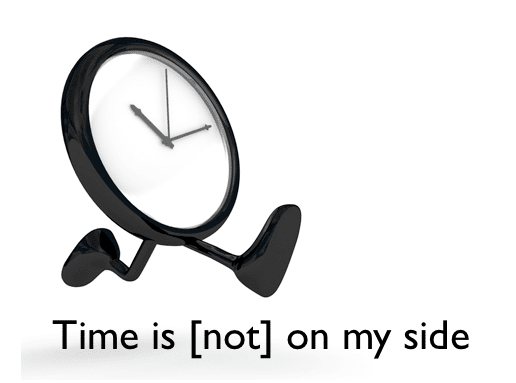Time to reflect

I recently saw the new Scorsese film, Hugo. While I didn’t like the film particularly (see the review here), time is certainly a central tenet of the film. Clocks abound. Hugo keeps winding {us} up the clocks… and Scorsese keeps winding us back in time. Time is precious. Our souvenirs, too.
People = time
Time is, after all, our rarest resource. And in business, that time is owned by and limited to the time of the staff. Even programmers and geeks need to take rests. Meanwhile, computers — like social media in a 24/7 connected world — run all the time.
In the asynchronous world of social media marketing, the human element (the 6th p of marketing = people) is central to any social media strategy.
Running out of time

The singular most dramatic issue I see in companies is the “lack of time” to do the job [well]. The issue for many organizations is reduced to time management skills. Yes, there are indeed ways to improve efficiency, upgrade productivity and manage time better. But, these are mechanical matters. However, there are two other more profound areas that need to be addressed in one’s desire to improve time management.
Time management
I would break time management down into three separate categories:
- on a shallow level, time management is about learning how to anticipate the unexpected (for example, the traffic jam on the drive to the meeting) or knowing how to start and end a meeting on time, etc.
- on a more profound level, time management needs to be about prioritization and figuring out who you are, where you want to go and why you are doing what you are doing. The key here, more than ever, is selecting what NOT to do.
- and, on another level, time management should also be about understanding our psycho-physiological nature and our internal biological clock. We are, generally, inveterate optimists (80% of us tend to consider ourselves above average). And, in a little known fact, we are naturally programmed (i.e. with our Circadian rhythm) to live in a 24.2-hour day. This fact (demonstrated in 1999 by Dr. Charles Czeisler and colleagues at Harvard), “probably explains why it is easier to fly west or move a shift schedule forward: going with the clock’s natural tendency for a ‘longer day’ is physiologically easier,” said Dr Mark Rosekind, VFSR*, who is now working on the board at the NTSB.
The natural clock at odds with our environment
This third point is where we could have so much more to learn in managing our time. We might, for example, tone down our ability to over-achieve versus the average person! Our internal biological clock is at odds with our external life and, this is all the more true with the hyper activity and extended hours that are caused by the internet and the competitive pressures. At the first level, a greater understanding of our biological clock would mean that we would learn more about our sleep, and how to sleep better. Lack of sleep is probably one of the most important chronic reasons for loss of productivity and poor time management.
At another level, if we knew that our biological clocks were programmed to live in a day that is longer than the one we have, we might more knowingly understand why we are, too often, overly optimistic about ourselves, much less our ability to manage our time.
*VFSR = very famous sleep researcher











Trackbacks/Pingbacks